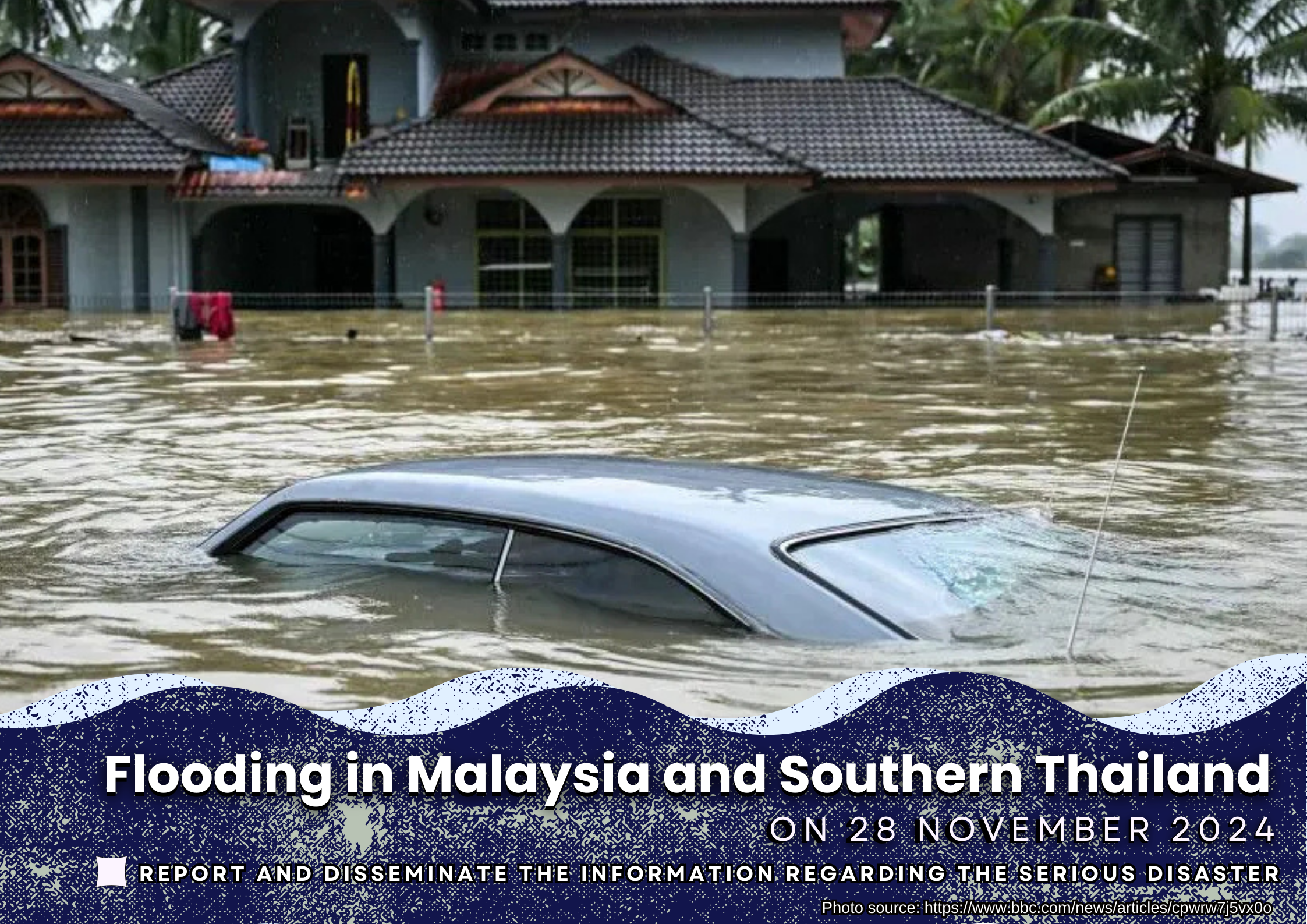

Flooding in Malaysia and Southern Thailand
Flooding and heavy rainfall in Malaysia and Southern Thailand on November 28, 2024
In the last weeks of November, Malaysia and the southern region of Thailand experienced an unpredictable situation with heavy rainfall that lasted several days, causing flooding and triggering landslides in some areas. For Malaysia, on November 28, 2024, it was reported that 25 districts in seven states including Johor, Kedah, Kelantan, Perak, Perlis, Sarawak, and Terengganu were affected by floods. Many households had to be evacuated, according to NADMA. In southern Thailand, on December 2, 2024, a low-pressure weather system covered, leading to moderate rainfall (12-29 mm) and heavy rainfall (38 mm) in some areas. These conditions caused flash flooding and severe flooding in water paths, affecting both highlands and lowlands. A total of 136,219 households were reported to have been affected by DDPM Thailand. Additionally, winds and waves were observed in the Gulf of Thailand and the Andaman Sea, with wave heights reaching 1-2 meters and the storm area experiencing waves over 2 meters.
Damages and losses
Impact on the affected area
In Malaysia, the flooding affected several areas in the states of Johor, Kedah, Kelantan, Perak, Perlis, Sarawak, and Terengganu. In the southern region of Thailand, several areas were affected by this situation, including Nakhon Si Thammarat, Narathiwat, Pattani, Satun, Songkhla, Surat Thani and Yala province according to the Ministry of Agriculture and Cooperatives, Thailand. This resulted in damage and destruction to agricultural crops in some areas, while other areas were affected by landslides. People have been evacuated, according to local reports.
Agricultural devastation
Several areas experienced severe flooding that damaged agricultural areas, including paddy rice, field crops, vegetable crops, perishable crops, and others. Many crops were estimated to have been lost, and both the paddy and agrofood sectors (the agrofood sectors, which are important for ensuring food security in Malaysia, also refer to food commodities or products such as crops, livestock, and fisheries, according to the Ministry of Agriculture and Food Security, Malaysia) have been significantly damaged in Malaysia and southern Thailand. The details as follow:
Agricultural Land:
Affected Crops:
Government response and countermeasures
Malaysia
Thailand
Sources:
(1) ASEAN Coordinating Centre for Humanitarian Assistance, National Disaster Risk Reduction and Management Council
(2) The prime minister’s Department of The National Disaster Management Agency (NADMA), Malaysia
(3) Department of Disaster Prevention and Mitigation. Ministry of Interior (DDPM), Thailand
(4) Ministry of Agriculture and Cooperatives, Thailand
References:
1. https://www.pptvhd36.com/news/%E0%B8%AA%E0%B8%B1%E0%B8%87%E0%B8%84%E0%B8%A1/237899 (Thai language)
2. https://www.moac.go.th/service_all-agriculture_situation (Thai language)
3. https://www.moac.go.th/warning-files-462991791042 (Thai language)
5. https://ahacentre.org/wp-content/uploads/2024/11/FlashUpdate_01_28Nov2024-FL-MYS-THAf.pdf
Download PDF file click here: Flooding in Malaysia and Southern Thailand
.jpg)
On 13–15 January 2026, the Office of Agricultural Economics (OAE), Thailand, in collaboration with the Ministry of Agriculture, Forestry and Fisheries (MAFF), Japan, and the AFSIS Secretariat, conducted the 1st Meeting of Japan–Thailand Expert Dialogue on Agricultural Statistics. The meeting was held at the Office of Agricultural Economics and field survey activities in Chonburi Province.

On 3–4 December 2025, the ASEAN Food Security Information System (AFSIS) Secretariat participated in the ASEAN Plus Three Emergency Rice Reserve (APTERR) Table Top Exercise (TTX) held in Bandar Seri Begawan, Brunei Darussalam.
/LINE_ALBUM_KRC_Cambodia_251204_13.jpg)
AFSIS and Development of Human Resources" in Cambodia On 27 November 2025, Mr. Charapon Chantorn, Deputy AFSIS Manager, participated in the Completion and Handover Ceremony of the project “Establishing the Real-Time ASEAN Food Security Information System (AFSIS) and Development of Human Resources, Phase 3 – Pilot Project on Strategic Crop Forecasting System for Food Security in Cambodia.” The ceremony was held in Phnom Penh, Cambodia, and jointly hosted by the Ministry of Agriculture, Food and Rural Affairs (MAFRA) of the Republic of Korea, the Ministry of Agriculture, Forestry and Fisheries (MAFF) of Cambodia, and the Korea Rural Community Corporation (KRC).

AFSIS Participated in APRSAF-31 to Strengthen Space Technology Cooperation for Regional Food Security On 18–19 November 2025, in Cebu City, the Republic of the Philippines, the ASEAN Food Security Information System (AFSIS) Secretariat, represented by Mr. Charapon Chantorn, Deputy AFSIS Manager, participated in the 31st Asia-Pacific Regional Space Agency Forum (APRSAF-31). The Forum, a key platform for promoting regional cooperation in space technology across the Asia-Pacific region, was co-organized by the Philippines Space Agency (PhilSA), the Ministry of Education, Culture, Sports, Science and Technology (MEXT) of Japan, and the Japan Aerospace Exploration Agency (JAXA).